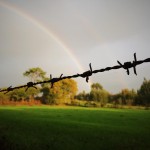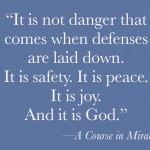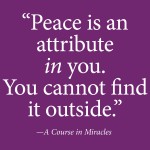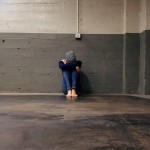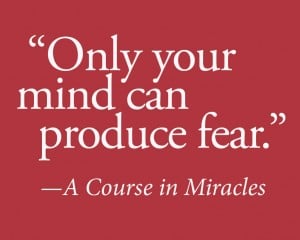 When my siblings and I were little, we played cowboys and Indians. We had the perfect costumes—red boleros with cowboy hats and pretend six-shooters, along with politically incorrect feathered headdresses and vests embroidered with fake beads.
When my siblings and I were little, we played cowboys and Indians. We had the perfect costumes—red boleros with cowboy hats and pretend six-shooters, along with politically incorrect feathered headdresses and vests embroidered with fake beads.
We’d run through the basement or the yard, crouch behind the washing machine or hide behind a tree and shoot each other with a “bang-bang” sound. It seemed harmless enough. All the kids in the neighborhood played the same game.
We watched old Westerns and spy thrillers, and we read books filled with good guys and bad guys. That was always the common element because, honestly, how can you have a story without a hero and a villain?
This, says A Course in Miracles, is a natural expression of a world that believes an enemy may be right around the corner. And that, I’m guessing, is what prompted one man in the trailer for The Armor of Light movie to say, “The only thing that stops a bad guy with a gun is a good guy with a gun.”
This is where A Course in Miracles takes the world as we know it, turns it upside down, shakes it inside out and spreads it before us like a map to a place we have long forgotten. Because the world as we know it, according to the Course, is simply a projection of our own thoughts. And only our minds can produce fear.
The drug dealer on the corner, the mentally ill loner near your kids’ school and the terrorist on the other side of the world are not the source or cause of your fear. They are expressions of it.
A Course in Miracles teaches that we’re all afraid, because we all have an ego part of our mind that believes it’s separate from God and one another. It’s the voice that says things like, “Everybody else is better than you,” and “What were you thinking?” and “It’s no use…you’ll never amount to anything.”
It’s the part that feels like it’s never enough, and its relentless attack on our emotional immune system makes us susceptible to all sorts of fears.
The drug dealer is afraid because he grew up listening to all the voices—including his own—that told him he’s no good, and he has given up on trying to prove them wrong.
The Fortune 500 executive is afraid because he sometimes feels like a fraud, and his whole future depends on the company’s next quarterly earnings.
The young mom is afraid because she’s putting on weight and thinks her husband won’t love her anymore, and sometimes she loses control and spanks her kids.
And the retired widow is afraid because she has spent her life making everyone else happy, but she’s not sure if she has ever really lived the life she wanted to live. What if it’s too late?
We all seem to be afraid of different things for different reasons. But when we trace those ego fears to their roots, we’re afraid for exactly the same reason: We’re not good enough, so we’ve got to rely on something outside ourselves for power and protection.
Ironically, the “bad” guy with a gun is making decisions based on fear. And the “good” guy with a gun is making decisions based on fear.
In fact, the belief that makes us feel separate and alone is the very thing that unites us all.
So what would life look like if we operated from the other part of our mind, the higher self? The part that remembers we can never be separate from God and one another? The still, small voice that reminds us we have nothing to prove because we’re whole and complete as we are?
- We’d stop making other people the enemy.
- We’d feel at home in the world.
- We’d be kinder to ourselves and one another.
- We’d be more forgiving.
- We’d remember that our ego, not the “other,” is the source of our fear. And that our connection to Spirit, not a gun, is the source of our safety.
We can grow up from those childhood games of good guys and bad guys.
It all starts by changing our minds.
Blessings,
Deb
Next in the series:
“It is not danger that comes when defenses are laid down. It is safety. It is peace. It is joy. And it is God.”

